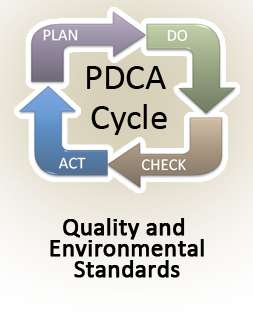 Companies can choose from an overwhelming number of international standards related to Management Systems, published by International Organization of Standardization (ISO). Just to start, you may apply for ISO 9001, ISO 14001, AS 9100, ISO 13485, TL 9001, ISO/TS 16949, and ISO 45001. The newest Healthcare Quality Management System ISO 7101 may be an option for health serving organizations. You may also want to combine or update any of these standards.
Companies can choose from an overwhelming number of international standards related to Management Systems, published by International Organization of Standardization (ISO). Just to start, you may apply for ISO 9001, ISO 14001, AS 9100, ISO 13485, TL 9001, ISO/TS 16949, and ISO 45001. The newest Healthcare Quality Management System ISO 7101 may be an option for health serving organizations. You may also want to combine or update any of these standards.
To determine which standard is right for your company, consider your industry, customer demands and long-term business goals and strategies.
Navigating the Maze of International Management System Standards
The landscape of international standards for Management Systems, set forth by the International Organization of Standardization (ISO), offers a robust framework for businesses aiming to optimize their operations, meet regulatory requirements, and exceed customer expectations. With a myriad of standards available, each designed to address different aspects of business excellence, selecting the right one(s) can seem daunting. Here’s a closer look at some of the key standards and how to align them with your business objectives:
- ISO 9001: Quality Management Systems – This standard provides a framework for consistent quality in products and services, enhancing customer satisfaction. It is versatile and applicable to any organization, regardless of size or industry.
- ISO 14001: Environmental Management Systems – Aimed at companies looking to manage their environmental responsibilities in a systematic manner, this standard helps in minimizing environmental footprint, complying with regulations, and improving environmental performance.
- AS 9100: Quality Management Systems for the Aerospace Industry – Tailored for the aerospace sector, it incorporates ISO 9001’s requirements with additional quality and safety standards specific to aerospace.
- ISO 13485: Medical Devices – Quality Management Systems – This specifies requirements for a quality management system where an organization needs to demonstrate its ability to provide medical devices and related services that consistently meet customer and regulatory demands.
- TL 9000: Quality Management System for the Telecommunications Industry – Developed to meet the supply chain quality requirements of the worldwide telecommunications industry, focusing on design, development, production, delivery, and service.
- ISO/TS 16949 (superseded by IATF 16949): Quality Management Systems for Automotive Production and Relevant Service Part Organizations – This standard combines global industry quality standards, outlining best practices for designing, developing, manufacturing, installing, and servicing automotive products.
- ISO 45001: Occupational Health and Safety Management Systems – Provides a framework to improve employee safety, reduce workplace risks, and create better, safer working conditions worldwide.
- ISO 7101: Healthcare Quality Management Systems – The newest addition, specifically designed for healthcare organizations to improve patient safety, care quality, and service efficiency.
Choosing the Right Standard for Your Business
Selecting the right standard(s) involves a deep dive into your company’s sector, operational processes, customer expectations, and strategic ambitions. Consider the following steps:
- Industry-Specific Requirements: Some industries have standards specifically designed for them, such as AS 9100 for aerospace or ISO 13485 for medical devices, which might be mandatory or highly recommended.
- Customer Expectations: Understanding what certifications your customers expect or require can guide you toward the standards that will enhance your marketability and customer satisfaction.
- Regulatory Compliance: Certain standards can help you comply with legal and regulatory requirements, reducing the risk of penalties and enhancing your reputation.
- Business Goals and Strategy: Align the choice of standards with your long-term objectives, such as sustainability goals with ISO 14001 or quality excellence with ISO 9001.
Integrating Standards into Your Business Strategy
Beyond selecting the right standards, the real value comes from effectively integrating them into your business processes and culture. This involves:
- Leadership Engagement: Ensure top management leads the initiative, demonstrating the importance of these standards to the entire organization.
- Continuous Improvement: Adopt a mindset of continual enhancement, using the standards as a framework for regular review and improvement of processes.
- Employee Involvement: Engage your team at all levels in the implementation and maintenance of these standards to foster a culture of quality and safety.
- Combining Standards: Many organizations find value in implementing multiple standards simultaneously, such as ISO 9001 and ISO 14001, to achieve comprehensive improvements across quality, environmental, and other management areas.
Conclusion
Embarking on the journey of international standard certification is a strategic move that can significantly enhance your operational excellence, market position, and customer satisfaction. By carefully selecting the right standards for your business and integrating them into your strategic planning, you can achieve a competitive edge and ensure long-term success.
For personalized guidance on selecting and implementing the right international standards for your organization, consider reaching out to experts like MSI. Our team can provide the insights and support you need to navigate this complex landscape and achieve your business goals.
The following table can get you started prior to contacting MSI:
|
||||||||||||||||||||||||||
Related Posts
- Crafting an ISO Management Review Procedure: Comprehensive Step-by-Step Guide for Achieving Success
- Leadership Mastery: Transforming from Mediocre to Exceptional Guide & Strategies
- Excellence through Risk, Corrective and Improvement Management
- Navigating Quality Management System for Medical Device Companies

